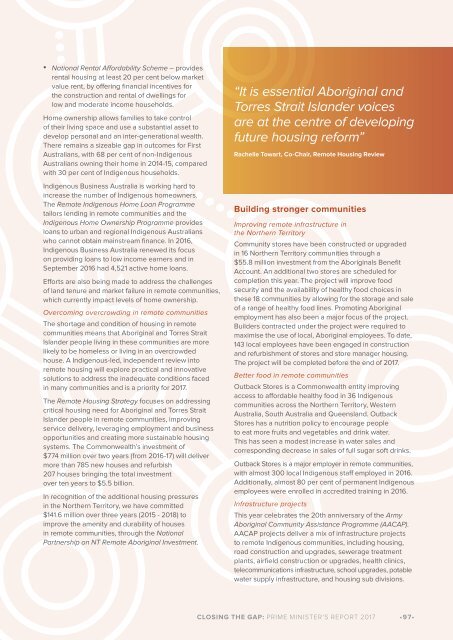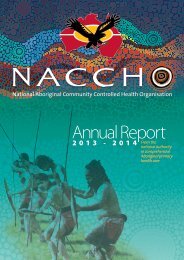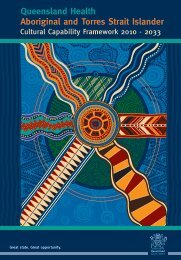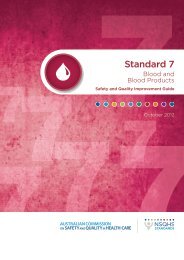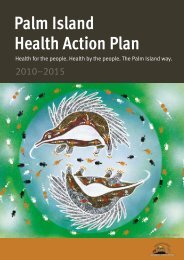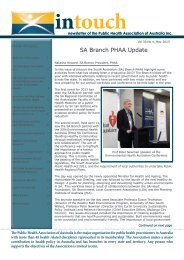CLOSING THE GAP
ctg-report-2017
ctg-report-2017
Create successful ePaper yourself
Turn your PDF publications into a flip-book with our unique Google optimized e-Paper software.
• National Rental Affordability Scheme – provides<br />
rental housing at least 20 per cent below market<br />
value rent, by offering financial incentives for<br />
the construction and rental of dwellings for<br />
low and moderate income households.<br />
Home ownership allows families to take control<br />
of their living space and use a substantial asset to<br />
develop personal and an inter-generational wealth.<br />
There remains a sizeable gap in outcomes for First<br />
Australians, with 68 per cent of non-Indigenous<br />
Australians owning their home in 2014-15, compared<br />
with 30 per cent of Indigenous households.<br />
Indigenous Business Australia is working hard to<br />
increase the number of Indigenous homeowners.<br />
The Remote Indigenous Home Loan Programme<br />
tailors lending in remote communities and the<br />
Indigenous Home Ownership Programme provides<br />
loans to urban and regional Indigenous Australians<br />
who cannot obtain mainstream finance. In 2016,<br />
Indigenous Business Australia renewed its focus<br />
on providing loans to low income earners and in<br />
September 2016 had 4,521 active home loans.<br />
Efforts are also being made to address the challenges<br />
of land tenure and market failure in remote communities,<br />
which currently impact levels of home ownership.<br />
Overcoming overcrowding in remote communities<br />
The shortage and condition of housing in remote<br />
communities means that Aboriginal and Torres Strait<br />
Islander people living in these communities are more<br />
likely to be homeless or living in an overcrowded<br />
house. A Indigenous-led, independent review into<br />
remote housing will explore practical and innovative<br />
solutions to address the inadequate conditions faced<br />
in many communities and is a priority for 2017.<br />
The Remote Housing Strategy focuses on addressing<br />
critical housing need for Aboriginal and Torres Strait<br />
Islander people in remote communities, improving<br />
service delivery, leveraging employment and business<br />
opportunities and creating more sustainable housing<br />
systems. The Commonwealth’s investment of<br />
$774 million over two years (from 2016-17) will deliver<br />
more than 785 new houses and refurbish<br />
207 houses bringing the total investment<br />
over ten years to $5.5 billion.<br />
In recognition of the additional housing pressures<br />
in the Northern Territory, we have committed<br />
$141.6 million over three years (2015 - 2018) to<br />
improve the amenity and durability of houses<br />
in remote communities, through the National<br />
Partnership on NT Remote Aboriginal Investment.<br />
“It is essential Aboriginal and<br />
Torres Strait Islander voices<br />
are at the centre of developing<br />
future housing reform”<br />
Rachelle Towart, Co-Chair, Remote Housing Review<br />
Building stronger communities<br />
Improving remote infrastructure in<br />
the Northern Territory<br />
Community stores have been constructed or upgraded<br />
in 16 Northern Territory communities through a<br />
$55.8 million investment from the Aboriginals Benefit<br />
Account. An additional two stores are scheduled for<br />
completion this year. The project will improve food<br />
security and the availability of healthy food choices in<br />
these 18 communities by allowing for the storage and sale<br />
of a range of healthy food lines. Promoting Aboriginal<br />
employment has also been a major focus of the project.<br />
Builders contracted under the project were required to<br />
maximise the use of local, Aboriginal employees. To date,<br />
143 local employees have been engaged in construction<br />
and refurbishment of stores and store manager housing.<br />
The project will be completed before the end of 2017.<br />
Better food in remote communities<br />
Outback Stores is a Commonwealth entity improving<br />
access to affordable healthy food in 36 Indigenous<br />
communities across the Northern Territory, Western<br />
Australia, South Australia and Queensland. Outback<br />
Stores has a nutrition policy to encourage people<br />
to eat more fruits and vegetables and drink water.<br />
This has seen a modest increase in water sales and<br />
corresponding decrease in sales of full sugar soft drinks.<br />
Outback Stores is a major employer in remote communities,<br />
with almost 300 local Indigenous staff employed in 2016.<br />
Additionally, almost 80 per cent of permanent Indigenous<br />
employees were enrolled in accredited training in 2016.<br />
Infrastructure projects<br />
This year celebrates the 20th anniversary of the Army<br />
Aboriginal Community Assistance Programme (AACAP).<br />
AACAP projects deliver a mix of infrastructure projects<br />
to remote Indigenous communities, including housing,<br />
road construction and upgrades, sewerage treatment<br />
plants, airfield construction or upgrades, health clinics,<br />
telecommunications infrastructure, school upgrades, potable<br />
water supply infrastructure, and housing sub divisions.<br />
<strong>CLOSING</strong> <strong>THE</strong> <strong>GAP</strong>: PRIME MINISTER'S REPORT 2017<br />
•97•


